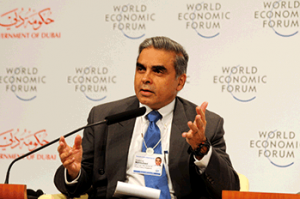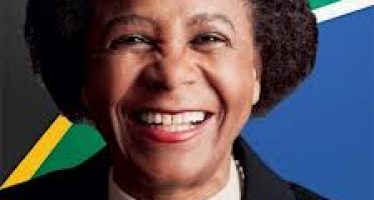Kishore Mahbubani: The Pendulum of History
 Kishore Mahbubani thoroughly enjoys yanking the West’s chain every now and then. The Singaporean diplomat has the uncanny ability to identify with pinpoint precision the weak spots in the discourse of developed nations, exposing embarrassing thought processes grounded in the lingering leftovers of times long since gone and powers lost decades ago.
Kishore Mahbubani thoroughly enjoys yanking the West’s chain every now and then. The Singaporean diplomat has the uncanny ability to identify with pinpoint precision the weak spots in the discourse of developed nations, exposing embarrassing thought processes grounded in the lingering leftovers of times long since gone and powers lost decades ago.
Mr Mahbubani makes no secret of the fact that he particularly dislikes the inclination of European and North American governments to freely dispense their wisdom and embark on lectures in order to show interlocutors – mostly developing nations – the error of their ways. “Western minds simply refuse to understand that now is not the time to intervene in other countries’ domestic affairs or criticise internal arrangements. By doing so, the West acts against its own best interests.”
Mr Mahbubani takes the long view of geopolitics and points out that for much of humanity’s convoluted history, China and India constituted the world’s largest economies and only superpowers. It was only the Industrial Revolution which, barely 250 years ago, tipped the balance of power in Europe’s – and later still North America’s – favour. “At the beginning of the 21st century, the world turned yet another corner with its centre of economic and political gravity returning to its original position. “The ascendancy of Asia is one of two great power shifts taking place; the other one is the IT revolution that erupted in California and has changed the world to beyond recognition.”
In his most recent book – Mr Mahbubani is a prolific writer – the diplomat offers a new, and quite controversial, take on post-war history. In Has the West Lost It?, Mr Mahbubani concludes that “no major Western figure” has had the courage to state “the defining truth” of our times. That truth includes the fact that the West is now becoming a mere footnote, or at best a minor chapter, of global affairs. The West is no longer able to set the global agenda, exploit its economic might, or maintain its technological edge. If Mr Mahbubani is to be believed, the West will – in due time – again be confined to the margins of world affairs, an outer region that follows rather than leads.
Mr Mahbubani considers this scenario a historic inevitability, albeit one brought about by the diplomatic mishandling by the United States of its position as the world’s sole superpower during the years following the collapse of the Soviet Union. The Singaporean diplomat does not hide his surprise at – bordering on disdain for – what he describes as US “bungling”. An utter lack of vision on what the role of the country should be in a unipolar world created a sort of power vacuum which others major players such as China tumbled into. According to Mr Mahbubani the US lost its lead with first the war in Afghanistan followed by the invasion of Iraq. Both grand and violent projects aimed to forge new nations in the image of their creator. That mission was not accomplished.
Whilst dismissing Donald Trump as “ignorant of world affairs”, Mr Mahbubani forgets, perhaps conveniently, that the current US president has condemned the interventions in Afghanistan and Iraq repeatedly and remains reluctant to commit his countries forces to new overseas adventures.
There is, however, some good news for beleaguered Western nations: Mr Mahbubani does not think it inevitable that China should take over as leader of the world. Asia’s rise, remarkable as it is, by no means guarantees that the region should once more become the centre of the world. Ambitious newcomers must deal with a world that is still organised along Western liberal thought – which, Mr Mahbubani concedes, is not necessarily all bad. Multilateral institutions such as the United Nations, the World Bank, and the International Monetary Fund are all designed to “benefit the West”. Whilst that may be too much of a blanket statement, it is to some extent true that these institutions all saw the light at a time when the West’s dominance remained undisputed. Since things have changed considerably since then, Mr Mahbubani argues that some room must be made at the top table to accommodate the rising powers of Asia – a proposal not at all controversial. Hence, Mr Mahbubani suggests the West to actively and generously cooperate with Asia and relinquish some of its power lest it be taken away altogether by developments.
After a career spanning 33 years at Singapore’s Ministry of Foreign Affairs, Mr Mahbubani became dean of the renowned Lee Kuan Yew School of Public Policy at the National University of Singapore where he also held a professorship in the Practice of Public Policy. Late last year Mr Mahbubani retired from academia. He continues to write thought-provoking books.
You may have an interest in also reading…
Vitali Klitschko: Punching Above His Weight
One of the greatest heavyweight boxing champions of all time, Klitschko retained his WBC title in September this year. Known
Dr Ramphele: Opposing the ANC
This year, Mamplela Ramphele, aged 65, formed Agang (Build) a political party to oppose the African National Congress (ANC). She
Dilma Rousseff: Big Shoes Too
Dilma Rousseff became the first female president of Brazil in October 2010. As successor to the popular and charismatic Luiz

















































































